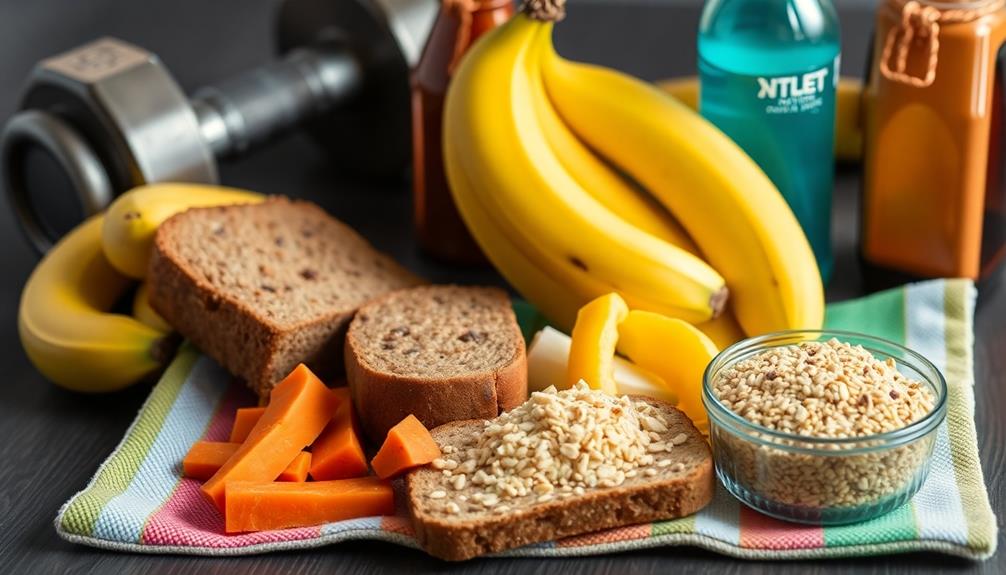After a workout, your body needs specific foods to replenish glycogen stores and support recovery. Focus on fast-acting carbohydrates like white rice, bread, sports drinks, bananas, and oatmeal. These have a high glycemic index and quickly restore energy. Pair carbs with protein for utmost results, aiming for a 3:1 carb-to-protein ratio. Consume these within 30 minutes to 2 hours post-exercise for best nutrient absorption. Don't forget to hydrate and replenish electrolytes with water, sports drinks, or coconut water. Preparing meals in advance can help you stay consistent with your post-workout nutrition. Understanding the science behind glycogen replenishment can notably boost your recovery and performance.
Core Insight
- Fast-acting carbohydrates like white rice, bread, sports drinks, and bananas support rapid glycogen replenishment post-workout.
- Consuming a combination of carbohydrates and protein enhances muscle recovery and glycogen restoration.
- Whole grains, fruits, and starchy vegetables provide carbohydrates necessary for glycogen replenishment.
- Lean proteins such as chicken, fish, tofu, or Greek yogurt aid in muscle repair and glycogen synthesis.
- Hydration with water or electrolyte-rich drinks supports nutrient transport and overall recovery, including glycogen replenishment.
Understanding Glycogen and Its Importance
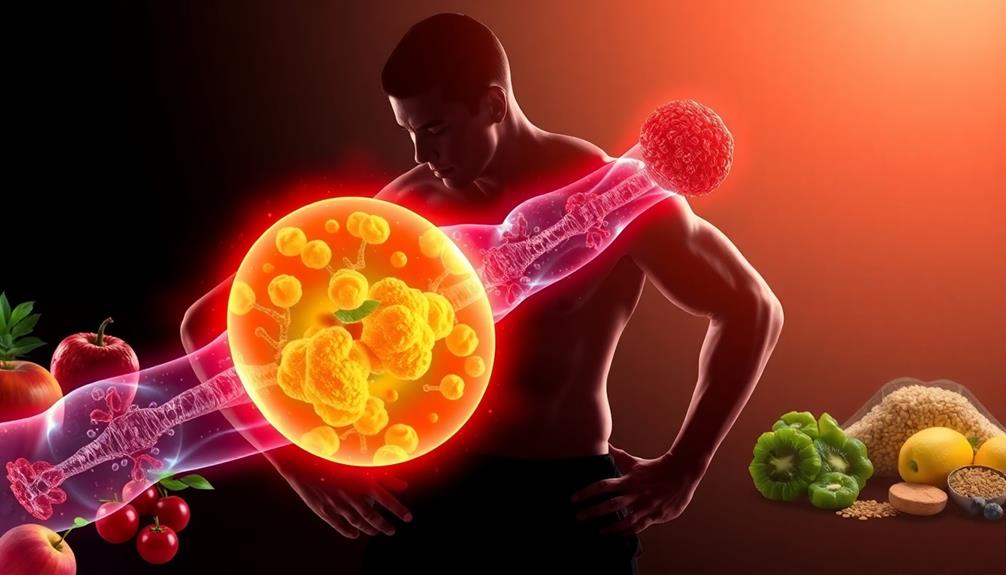
Glycogen is your body's main way of storing energy. It's a complex carb that your body makes from the food you eat. Your body stores glycogen mostly in your liver and muscles. When you work out, your body breaks down glycogen to fuel your muscles and keep your blood sugar levels steady. Carbs that work fast are great for quickly refilling your glycogen after a workout. They help kick-start your recovery.
After a workout, your glycogen stores are low. It's important to fill them back up. This process is called glycogen resynthesis. It's key for recovery and getting your body ready for future workouts. Properly restocking your glycogen can help reduce muscle soreness, boost performance in later workouts, and support overall muscle health.
Knowing how important glycogen is can help you make smart choices about what to eat after a workout. By focusing on the right foods, you can make the most of your glycogen stores and improve your athletic performance.
Fast-Acting Carbohydrate Sources
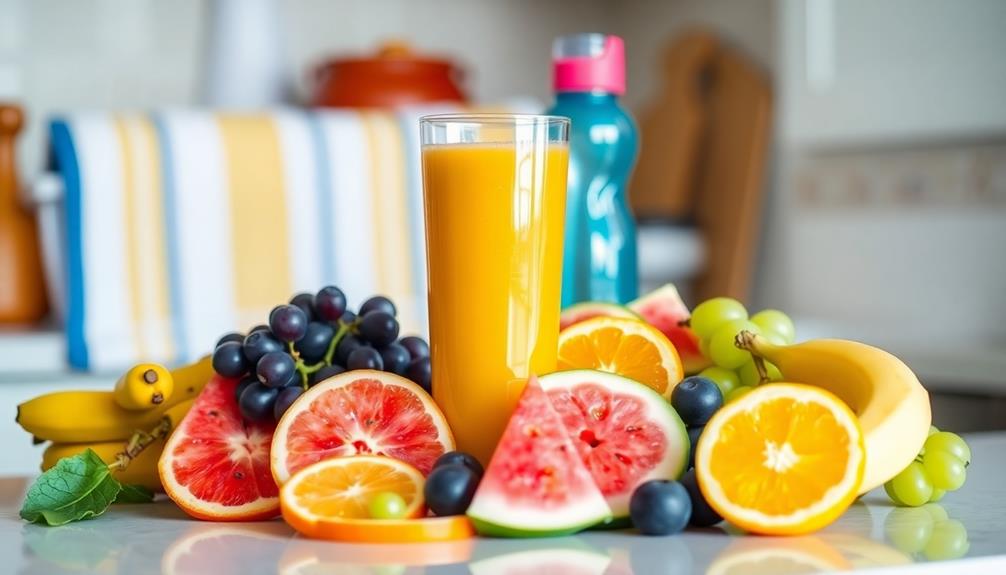
Fast-acting carbs are the best way to quickly replenish glycogen after a workout. These foods digest and absorb rapidly, giving your muscles the glucose they need to efficiently rebuild glycogen stores. For optimal recovery, consider using carbohydrate powders that provide fast-acting, easy-to-digest carbs to rapidly restore energy and glycogen post-workout.
Great sources of fast-acting carbohydrates include:
- White rice or rice cakes
- White bread or bagels
- Sports drinks or fruit juices
- Ripe bananas
- Instant oatmeal
- Pretzels or crackers
- Potatoes (white or sweet)
- Honey or maple syrup
These foods have a high glycemic index, which means they'll quickly raise your blood sugar levels. To maximize glycogen replenishment, try to eat these foods within 30 minutes after your workout. Eating them with a protein source can further improve the process, supporting both muscle recovery and glycogen restoration.
Protein's Role in Glycogen Replenishment

Protein plays a key role in restoring glycogen after a workout, even though carbs are the main fuel source. Eating protein with carbs helps your body make more glycogen and recover faster. A good rule of thumb is to have 3 or 4 grams of carbs for every gram of protein.
Protein helps in three main ways:
- It triggers insulin release, which helps your muscles absorb glucose better.
- It repairs muscle damage from exercise, so you recover quicker.
- It digests slowly, giving you steady energy over time.
Optimal Timing for Post-Workout Nutrition

Refueling your body after a workout is crucial for recovery. The best time to eat is within 30 minutes to 2 hours post-exercise. Your body absorbs nutrients well during this time, helping restore energy. A balanced meal or snack with carbs and protein works best.
For optimal results, try these tips:
- Eat carbs and protein together
- Consume 0.5-0.7 grams of carbs per pound of body weight
- Include 15-25 grams of protein
If a full meal isn't possible right away, a protein shake with fruit or yogurt parfait makes a great snack. The key is consistency. While post-workout nutrition is important, regular, balanced meals all day also support recovery and energy levels.
Hydration and Electrolyte Balance
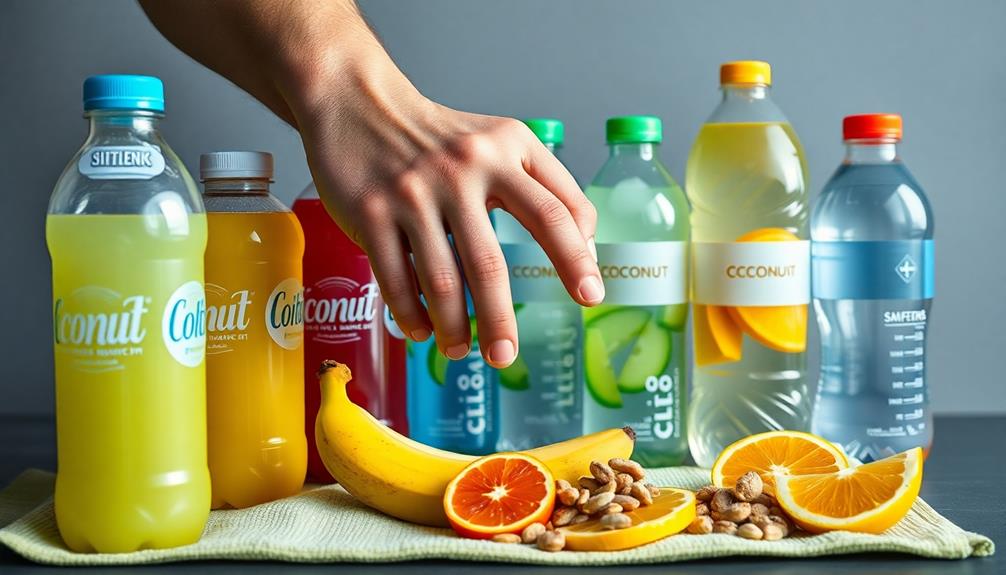
Drinking enough water and replenishing electrolytes is crucial after a workout. You need to replace fluids lost through sweat and restore important minerals like sodium, potassium, and magnesium. Water should be your main drink, but for intense workouts over an hour, sports drinks with electrolytes can help. Coconut water is a natural option that's high in potassium and other minerals. Look for coconut water brands that focus on nutrition and have minimal added sugars. Some even have extra vitamins and electrolytes for better recovery. Don't forget about foods with electrolytes, too. Bananas, oranges, and leafy greens are great picks. For sodium, put a little salt on your post-workout meal or snack. Try to drink 16-24 ounces of fluid for each pound of weight lost during exercise. Pay attention to your thirst and check your urine color – light yellow means you're well-hydrated.
Whole Foods vs. Supplements
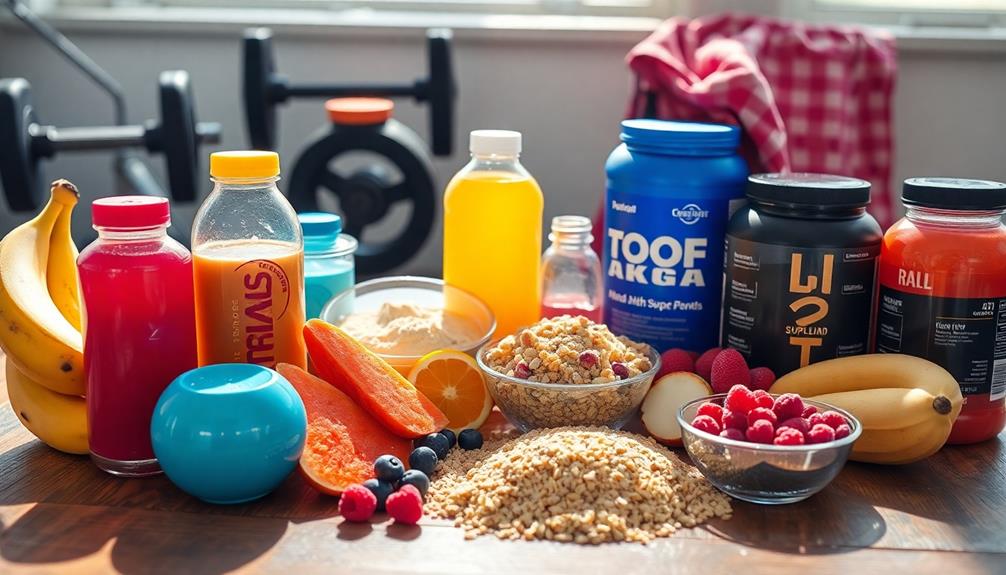
When it comes to post-workout recovery, you can choose between whole foods and supplements for glycogen replenishment. Both have benefits, but whole foods offer more than just carbs.
Whole foods are packed with vitamins, minerals, and antioxidants that support your health and recovery. They also have fiber, which helps with digestion and keeps you feeling full. Plus, the natural sugars in whole foods are balanced, so you don't get sudden blood sugar spikes.
Supplements are convenient when you're busy or need specific amounts of nutrients. They're easy to take with you and provide quick energy. Powdered fast-acting carbs are great for quickly restoring glycogen after a workout. They mix easily and can be combined with other nutrients for optimal recovery.
The best approach is often a mix of whole foods and supplements. This lets you customize your post-workout nutrition to your specific needs and lifestyle.
Tailoring Nutrition to Exercise Intensity

Your body needs different amounts of carbohydrates after exercise, depending on how hard you worked out. The harder the workout, the more carbs you'll need to refuel.
After high-intensity exercise, your body's glycogen stores (the energy reserves in your muscles) get used up quickly. You'll need to eat more carbs soon after finishing to replenish them. For easier workouts, you don't need to refuel as urgently.
Check this table to see how many grams of carbs per kilogram of body weight you should eat each hour, based on exercise intensity:
Low intensity: 0.5-0.7 g/kg/hour
Moderate intensity: 0.7-1.0 g/kg/hour
High intensity: 1.0-1.2 g/kg/hour
Very high intensity: 1.2-1.5 g/kg/hour
Extreme intensity: 1.5-2.0 g/kg/hour
After tough workouts, eat easy-to-digest carbs within 30 minutes of finishing. For less intense sessions, you can wait up to 2 hours. Focus on not just how much you eat, but also eating at the right times and choosing nutritious carb sources. This will help your body recover well and be ready for your next workout.
Long-Term Benefits of Proper Replenishment
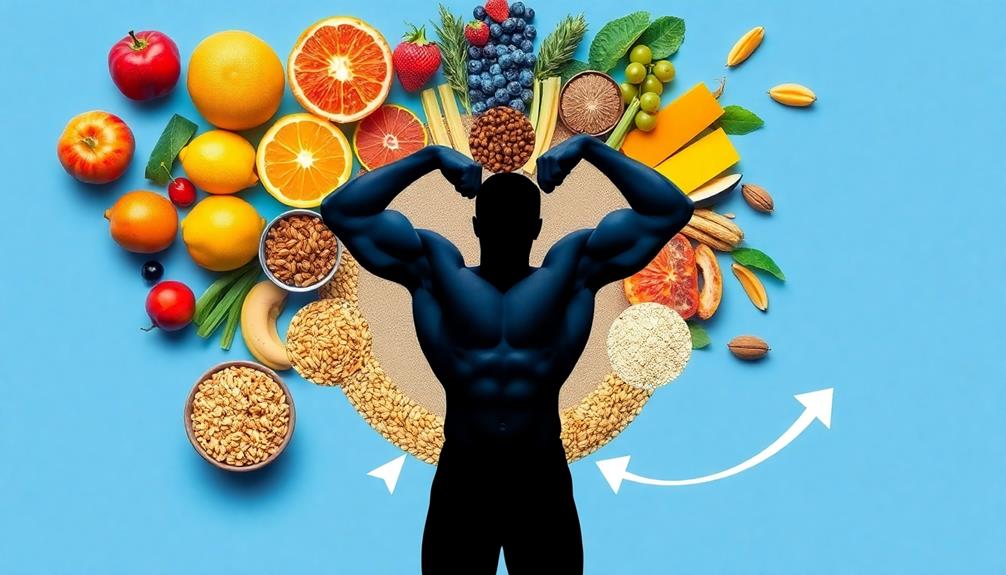
Restocking your body's energy stores after exercise comes with lasting benefits. Make it a regular habit and you'll see long-term progress in your fitness. Here are three main benefits of proper post-workout nutrition:
- Better muscle growth and repair
- Stronger performance in future workouts
- Lower chance of overtraining and injury
When you refuel consistently, your body gets better at storing and using energy. This means improved endurance and strength over time. Carb supplements offer a quick and easy way to replenish, especially when you're short on time. Proper recovery between workouts also allows you to train harder and more often. Keeping up with post-workout nutrition helps you build and maintain muscle mass. As you stick with it, you'll see gains in overall athletic performance and bust through fitness plateaus.
Common Mistakes to Avoid
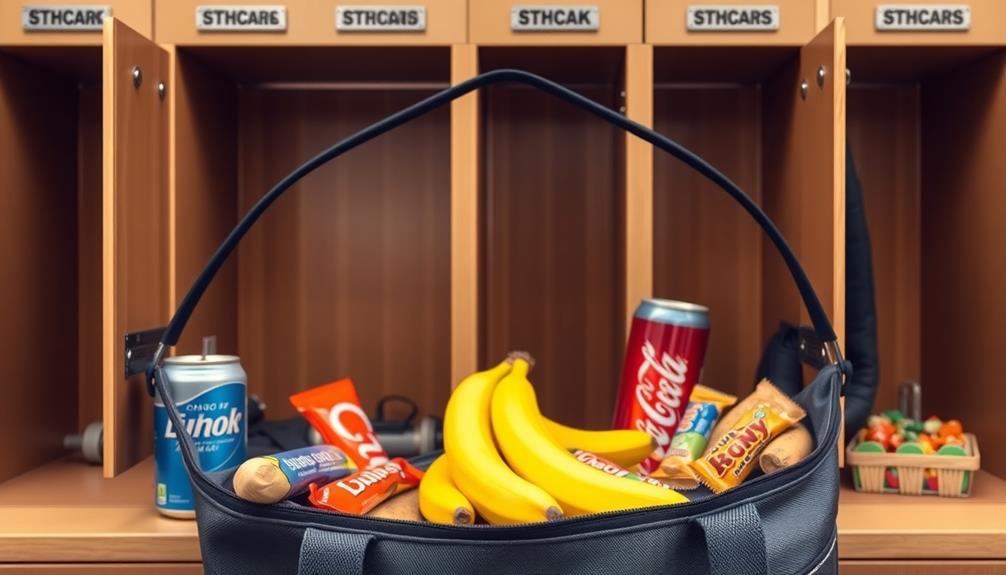
Many athletes make mistakes with their post-workout nutrition that can slow down recovery and progress. One common error is waiting too long to eat after exercising. Try to eat a meal or snack within 30-60 minutes after your workout. This helps your body refuel its energy stores.
Another mistake is not eating enough carbohydrates. Your body needs carbs to restock the energy used during exercise. Protein is also important for repairing and growing muscle. Don't just rely on sports drinks, as they may not have all the nutrients you need for good recovery. Think about using hydration powders that have a mix of electrolytes and key vitamins.
Lastly, remember to stay hydrated. Drinking enough fluids replaces what you lose through sweat and helps transport nutrients in your body. By avoiding these mistakes, you'll help your body get the nutrition it needs to recover well and get stronger.
Meal Planning for Glycogen Restoration
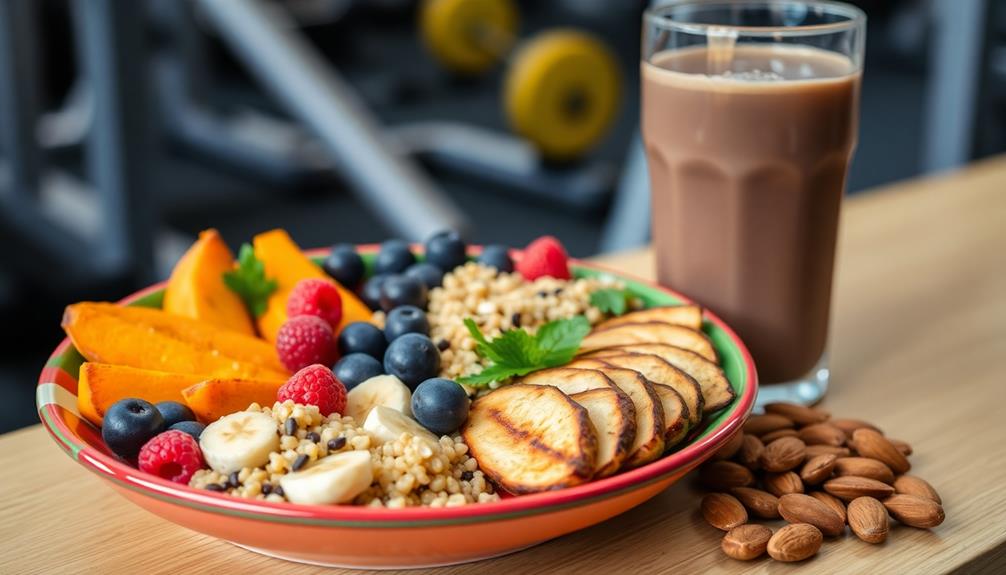
Eating the right foods after your workout is key to restoring your glycogen levels. Try to eat a meal with both carbs and protein within 30 minutes of finishing your workout. This will help your body replenish its glycogen stores quickly and effectively.
When planning your post-workout meals, focus on including:
- Carbs from whole grains, fruits, and starchy veggies
- Lean proteins like chicken, fish, tofu, or Greek yogurt
- Plenty of water or drinks with electrolytes to rehydrate
Aim for about 3 times as many carbs as protein in your meal. This ratio is ideal for boosting glycogen and helping your muscles recover. It's a good idea to prep your meals ahead of time, so you have the right foods ready to go after your workout. By following this meal plan, you'll be giving your body the nutrients it needs to bounce back and feel great.
Frequently Asked Questions
Can Certain Foods Hinder Glycogen Replenishment?
Yes, certain foods can hinder glycogen replenishment. You'll want to avoid high-fat meals, excessive alcohol, and foods low in carbohydrates. These can slow down the process, making it harder for your body to restore its glycogen stores efficiently.
How Does Alcohol Consumption Affect Post-Workout Glycogen Restoration?
Alcohol consumption negatively impacts your post-workout glycogen restoration. It impairs your body's ability to replenish glycogen stores, slows down muscle recovery, and can dehydrate you. You'll want to avoid alcohol to optimize your recovery process.
Are There Any Medical Conditions That Impact Glycogen Storage Capacity?
You should be aware that several medical conditions can affect your glycogen storage capacity. These include glycogen storage diseases, diabetes, liver disorders, and certain muscle-related conditions. It's important to consult your doctor if you're concerned about your glycogen levels.
Do Genetics Play a Role in Glycogen Replenishment Efficiency?
Yes, your genetics can influence glycogen replenishment efficiency. You'll find that certain gene variations affect how quickly you replenish glycogen stores. Your genetic makeup may impact enzyme activity and glucose transport, affecting overall glycogen storage capacity.
How Does Age Affect the Body's Ability to Replenish Glycogen Stores?
As you age, your body's ability to replenish glycogen stores may slow down. You'll likely experience decreased insulin sensitivity and muscle mass, which can affect glycogen synthesis. However, you can still maintain efficient replenishment with proper nutrition and exercise.

